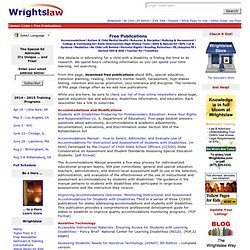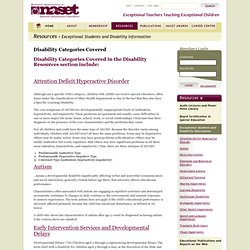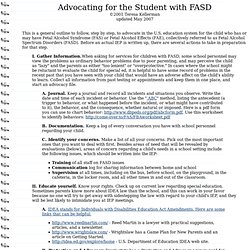

Education World® : Special Education : Cautions about High-Stake Testing. With the growing use of high-stakes tests, the American Educational Research Association is recommending that school district leaders and policy makers take a close look at the organization's guidelines before linking school reform to test scores.

The guidelines are AERA's effort to prevent such tests from harming students. Included: A summary of the guidelines for using high-stakes tests. The governing board of the American Educational Research Association (AERA) recently issued school district leaders and policy makers guidelines about high-stakes tests. In a statement, the organization acknowledges that although policy makers generally institute high-stakes tests with the good intention of improving education, they need to carefully evaluate the tests' potential to cause serious harm. The AERA guidelines suggest the following possible negative outcomes as a result of high-stakes tests: Students may be placed at increased risk of educational failure and dropping out.
IEPs, Special Education, Autism, Assessment, Learning ... One obstacle in advocating for a child with a disability is finding the time to do research.

We spend hours collecting information so you can spend your time learning, not searching. From this page, download free publications about IEPs, special education, transition planning, reading, children's mental health, harassment, high-stakes testing, retention and social promotion, zero tolerance and discipline. The contents of this page change often as we add new publications.
While you are here, be sure to check our list of free online newsletters about legal, special education law and advocacy, disabilities information, and education. Each newsletter has a link to subscribe. Accommodations and ModificationsStudents with Disabilities Preparing for Postsecondary Education: Know Your Rights and Responsibilities (U.
Accommodations Manual: How to Select, Administer, and Evaluate Use of Accommodations for Instruction and Assessment of Students with Disabilities. WATI Assessment Package. National Association of Special Education Teachers ... Disability Categories Covered in the Disability Resources section include: Attention Deficit Hyperactive Disorder Although not a specific IDEA category, children with ADHD can receive special education, often times under the classification of Other Health Impairment or due to the fact that they also have a Specific Learning Disability.

The core symptoms of AD/HD are developmentally inappropriate levels of inattention, hyperactivity, and impulsivity. These problems are persistent and usually cause difficulties in one or more major life areas: home, school, work, or social relationships. Clinicians base their diagnosis on the presence of the core characteristics and the problems they cause. Not all children and youth have the same type of AD/HD. Predominantly Inattentive Type Predominantly Hyperactive-Impulsive Type Combined Type (inattention, hyperactivity-impulsivity) Autism Early Intervention Services and Developmental Delays Emotional and Behavioral Disorders Hearing Impairment. Advocating for the Student with FASD. This is a general outline to follow, step by step, to advocate in the U.S. education system for the child who has or may have Fetal Alcohol Syndrome (FAS) or Fetal Alcohol Effects (FAE), collectively referred to as Fetal Alcohol Spectrum Disorders (FASD).

Before an actual IEP is written up, there are several actions to take in preparation for that step. I. Gather Information.When asking for services for children with FASD, some school personnel may view the problems as ordinary behavior problems due to poor parenting, and may perceive the child as "lazy" and the parents as either "too lenient" or "overprotective. " In cases where the school might be reluctant to evaluate the child for special ed, it is helpful to have some record of problems in the recent past that you have seen with your child that would have an adverse affect on the child's ability to learn. Collect all information from past testing or appointments and keep them in one place, and start an advocacy file.
A. II. A. III.